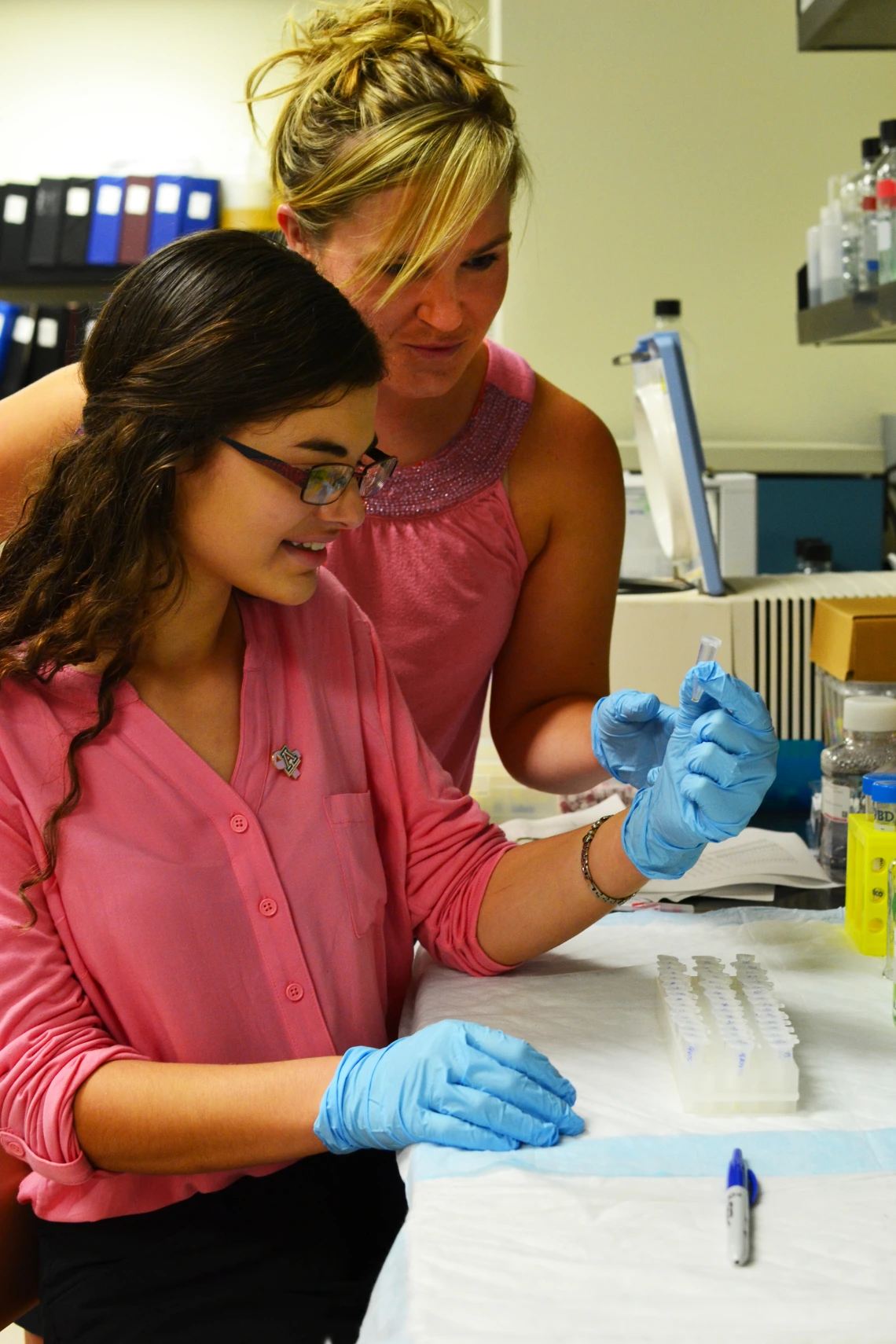UA Cancer Center, Honors College Partner to Support Breast Cancer Research, Awareness

TUCSON, Ariz. – The University of Arizona Honors College and the University of Arizona Cancer Center are partnering this month to promote breast cancer awareness and raise money to fund the research of Honors College student Ariane Guthrie and Jessica Martinez, PhD, of the UA Cancer Center.
Guthrie and Dr. Martinez are working together to find a way to help prevent breast cancer by studying the effects of resveratrol on human enzymes and metabolites that are part of pathways related to cancer prevention. Resveratrol is a polyphenol found in grapes and peanuts that has been attributed to a variety of health benefits, including cancer prevention.
More than two-thirds of American adults are overweight or obese, and one-third of all breast cancer diagnoses may be related tothese issues, Dr. Martinez said. Increased body weight is associated with clinical factors such as insulin resistance, chronic inflammation and increased circulating sex hormones, all of which contribute to the initiation and progression of obesity-related cancers, including breast cancer.
“Given the continued increase in overweight and obese Americans, despite public health efforts to promote diet and exercise,” Dr. Martinez said, “identification of chemoprevention agents that target the metabolic deregulation associated with overweight issues and obesity will hopefully have a larger impact on lowering cancer burden than weight-loss programs alone.”
Previous resveratrol studies have shown metabolic deregulation in animal models but human trials have been limited. “Resveratrol’s effect in humans is not well-characterized,” Dr. Martinez said. “If we can get a systemic picture of what’s going on in an individual, then we can learn which pathways resveratrol targets in a person.”
Guthrie hopes to identify which metabolites are altered by resveratrol, and how that process works, through metabolomics analysis, which is an analysis of the set of molecular chemicals from a biological sample.
“By having a snapshot of an individual’s responses to resveratrol, we can identify how metabolites are altered,” Guthrie said. “Recognizing shifts in one’s metabolomics profile can help us understand how resveratrol is acting in the human body and how this action might reduce the risk for breast cancer.”
A greater understanding of which metabolites are affected by resveratrol potentially could lead to preventing breast cancer in some patients through resveratrol supplementation, which is extremely important, for even patients who have been diagnosed with, and successfully treated for, breast cancer can experience remission. “This is why identifying preventative strategies, such as resveratrol supplementation, is so critical,” Guthrie says.
There is another reason why identifying a preventive measure for breast cancer is important. “The treatment for breast cancer, or any cancer for that matter, is brutal,” Guthrie says.
One in eight women will be diagnosed with breast cancer, and because it is so far-reaching, chances are that you or someone you know has been affected by the disease. “Breast cancer is a highly preventable disease, yet there are over 230,000 new cases each year,” Dr. Martinez says. “If we can implement prevention strategies, we can make a huge impact for women in the future.”
This research is just one step toward a medical breakthrough, but it is a significant step. Knowing exactly how the metabolome is affected by resveratrol will lead to more effective measures in the future.
“If resveratrol’s targets are not elucidated, we cannot know exactly how this compound is acting in our bodies,” Guthrie said. “This research could be a major step forward toward understanding those targets.”
Dr. Martinez, Guthrie, the UA Cancer Center and the UA Honors College are engaging the UA community by encouraging students, faculty and administration to wear pink each Wednesday in October and make a donation at the UA Honors College (Slonaker House - 1027 E. Second St.) to support the research. The first $1,000 will be matched by UA Honors College Dean Patricia MacCorquodale, PhD, UA Cancer Center Director Andrew Kraft, MD, and the development officers from those two units, Scott Koenig and David Scott Allen.
Contact: Chris Nordensson, 520-621-8255 (Honors College) or Anna Christensen, 520-626-6401 (UA Cancer Center)
You can learn more about the UA Honors College by visiting www.honors.arizona.edu or calling 520-621-6901. The college office is at 1027 E. Second St., Tucson, Ariz., 85721-0006.



